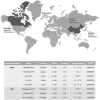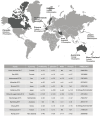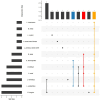Depression-associated gut microbes, metabolites and clinical trials
- PMID: 38357350
- PMCID: PMC10864537
- DOI: 10.3389/fmicb.2024.1292004
Depression-associated gut microbes, metabolites and clinical trials
Abstract
Depression is one of the most prevalent mental disorders today. Over the past decade, there has been considerable attention given to the field of gut microbiota associated with depression. A substantial body of research indicates a bidirectional communication pathway between gut microbiota and the brain. In this review, we extensively detail the correlation between gut microbiota, including Lactobacillus acidophilus and Bifidobacterium longum, and metabolites such as short-chain fatty acids (SCFAs) and 5-hydroxytryptamine (5-HT) concerning depression. Furthermore, we delve into the potential health benefits of microbiome-targeted therapies, encompassing probiotics, prebiotics, and synbiotics, in alleviating depression. Lastly, we underscore the importance of employing a constraint-based modeling framework in the era of systems medicine to contextualize metabolomic measurements and integrate multi-omics data. This approach can offer valuable insights into the complex metabolic host-microbiota interactions, enabling personalized recommendations for potential biomarkers, novel drugs, and treatments for depression.
Keywords: clinical trials; depression; gut microbiota; metabolites; pathogenesis.
Copyright © 2024 Wang, Song, Lai, Tang, Dou and Yang.
Conflict of interest statement
The authors declare that the research was conducted in the absence of any commercial or financial relationships that could be construed as a potential conflict of interest.
Figures




References
-
- Akkasheh G., Kashani-Poor Z., Tajabadi-Ebrahimi M., Jafari P., Akbari H., Taghizadeh M., et al. (2016). Clinical and metabolic response to probiotic administration in patients with major depressive disorder: a randomized, double-blind, placebo-controlled trial. Nutrition 32, 315–320. doi: 10.1016/j.nut.2015.09.003 - DOI - PubMed
Publication types
LinkOut - more resources
Full Text Sources
Miscellaneous

